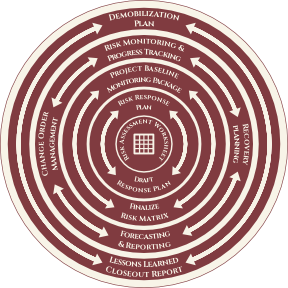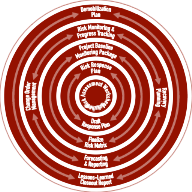Training & Corporate Development
“Brown-Bag” training courses are designed to be taught over a long lunch so that key personnel do not have to leave the office or job site. This approach minimizes any potential disruption and keeps your personnel both productive and safe. Each course is designed as a self-contained module, so that experienced Project Managers can focus in on and select only the specific course topics of interest using our Ala Carte approach; while less experienced PMs can use the entire series to improve profitability by learning all the Project Management process-steps and skill-sets at their own pace.
Each Brown-Bag course includes the initial online Skype/Zoom presentation instructional session and a follow-up online Skype/Zoom question & answer session along with course materials.
Courses
PM-002: Pre-Bid Risk Assessment: Establishing the Proper Level of Project Control Detail
This course presents a consistent, repeatable, and transparent process to easily perform an objective analysis of potential project risk – ideally performed prior to the project initiation phase. The process graduates from a qualitative management discussion to a quantitative risk assessment tied to a preliminary risk response strategy that makes project proposals more accurate, informed, and competitive. This process simultaneously establishes the recommended level of project control detail necessary to efficiently manage and effectively control the project.
PM-003: Scope, Assumptions & Contract Risk Analysis
This course discusses the importance of having a clearly defined project scope with quantified deliverables, assumptions, and clarifications prior to contract signature. The different types of contract formats and their associated risks are examined along with specific contract language that Project Managers can use to minimize risk when implementing the Project Performance Management System.
PM-004: Scheduling to the Optimal Level of Detail
This course examines how to create a project schedule that best reflects the appropriate amount of task detail. The required level of detail is based on the graded-approach control level determined by the risk assessment process. This course also covers fundamental scheduling activities and is tool independent.
PM-005: Estimating: Process Flow vs. Art Form
Estimating can be a very subjective and personalized process. This course takes some of the mystery out of estimating by breaking down the process into generic repeatable elements. Focus is on understanding each step in the process and its role in generating the overall cost estimate. This course is also not tool-specific and is applicable across all industries.
PM-006: Risk Response Strategies & Establishing the Basis For Project Contingency
Strategic Risk Response Plans help you develop a competitive edge, present educated well-constructed Project Proposals, and protect your Company from accepting blind risk. Every good Manager should know how to develop a Risk Response Plan and use contingency as a tool to protect projects from schedule slippage and/or cost overruns from unexpected events. In addition to guidance on crafting Strategic Risk Response Plans, this course also examines ways in which Contingency can be identified, quantified, and used during the project – including a methodology to release unused contingency in a controlled manner after risk events have passed.
PM-007: Work Breakdown Structure & Charge Codes
This course examines the definition of a Work Breakdown Structures (WBS) and its use on a project. Participants will learn how to match the project control level to the proper level of detail in the WBS. Also discussed is the process of mapping the WBS to Job Charge Codes to reconcile the project budget.
PM-008: Establishing the Project Baseline
This course focuses on building a solid project foundation – the Project Baseline Package. Without properly documenting the original contractual Project Plan, Change Order Management becomes extremely difficult, if not impossible, because identifying progress performance & proving changed conditions requires measuring against the Contract Plan. The steps to creating a proper Project Baseline Package, what it means to “Baseline” the project, and using the Baseline to establish a starting point to measure progress & performance against are discussed in detail.
PM-009: Project Execution Planning: Creating the Job Book
Project Execution Planning takes the Project Baseline Package and adds the remaining logistical elements necessary to physically build the project. The Project Execution Plan (PEP) is used & updated throughout project execution phase and is reviewed during the Project Closeout Lessons Learned meeting. and and ends with the Project CloseoutThis course discusses each of the critical steps in the Project Planning process and generates an understanding of the various elements and the level of detail that must be captured and documented in the Project’s Job Book.
PM-010: Optimizing Resources and Completing the Gap Analysis
This course discusses a methodology for optimizing the manpower and equipment resources on a project. Identifying and eliminating the non-productive “gaps” in the construction schedule, re-sequencing activities, and generating manpower histograms to reduce peak manpower needs are covered in detail. Resource optimization represents the first opportunity to improve project margins by ensuring that project resources are used as efficiently as possible.
PM-011: Project Management Safety: An Attitude
This course provides an overview of Project Safety and insight on how the Project Manager can set the tone on a job site to develop the proper “Safety Attitude”. Accidents affect productivity, project momentum, job cost, and overall project progress and are always preventable.
PM-012: Change Order Management
This course presents proactive change order management and use of the ACID methodology. Proactive Change Order Management is a key opportunity to improve project margins, and when handled properly (using the ACID Methodology) it increases customer satisfaction and strengthens the relationship. Projects will always undergo some amount of change during the project lifecycle and this course prepares the project manager to leverage those opportunities to the benefit of the project.
PM-013: Financial Risk Management: Managing & Using Contingency
This course re-examines the flow of risk through the project lifecycle and explains how to optimize Financial Performance using the Risk Matrix tool and the different Risk Response Strategies available to manage risk. The ties between progress tracking and financial risk management are explored. The use of contingency as a “soft” job cost to control financial risk exposure and levelize reporting is discussed in detail as part of the project’s overall Risk Management plan. The Risk Matrix tool and its different variations are presented in detail to simplify managing Risk Response & Contingency at the different project control levels.
PM-014: Tracking Physical Progress & Financial Performance
This course presents an in-depth discussion of key cost drivers, selection of Key Performance Indicators (KPIs), and mapping KPIs to the Cost Budget to simplify Operational Performance Management. Special attention is given to developing and using Key Performance Indicator Charts to provide early detection of project conditions that could adversely impact future project performance. The proven power of KPI Charts to effectively monitor physical production progress, financial performance, and field productivity performance is presented using real-life project examples. Prudent use of these tools, which can be scaled up of down depending on project size, provides greater response time to make proactive performance adjustments crucial to maintaining a healthy and profitable project.
PM-015: Forecasting and Reporting Using Performance Trend Analysis
This course presents a methodology to simplify and significantly improve project forecasting & reporting skills. Key Performance Indicator Curves are combined into KPI Charts to demonstrate the power & simplicity of using Schedule, Cost, and Productivity performance trends to forecast future Operational & Financial performance. Operational Performance Management using KPI Charts is presented in detail along with a brief discussion of advanced project management terminology such as earned value, cost performance index (CPI), and schedule performance index (SPI).
PM-016: Managing Subcontractor Performance
Subcontractor performance directly impacts a Project Manager’s ability to successfully deliver a Project, and as such, Subcontractors should be managed similar to and with the same level of detail as self-perform labor. This course examines simplified means and methods to measure and monitor subcontractor progress, analyze performance, and direct Performance Recovery Actions to achieve successful project delivery. The elements of a Subcontract are also discussed, including commercial risk management items such as insurance certificates, performance & payment bonds, etc.
PM-017: Recovery Planning & Performance Management
This course presents analysis of the Recovery Planning process and its integral role in the Operational Performance Management Cycle, including a detailed discussion of Complete, Partial, and “Wishful Thinking”/No Recovery options. Use of KPI Charts and trend analysis to anticipate the impacts of performance issues is explained including developing & implementing Recovery Plans to proactively adjust & correct project performance. The “ripple effect” progression that occurs when performance issues are left untreated is discussed, as well as how to formulate quick response plans to prevent further impact and erosion of project margin.
PM-018: The Job Closeout: Capturing Lessons-Learned
This course examines the operational, contractual and financial closeout requirements to properly shut down all the elements of a project. Special emphasis is given to demobilization as another key area to improve project margins. Finally, the ability of a Project Manager to positively impact the performance of future projects within the organization is addressed through the effective use of a Lessons-Learned process.
PM-021: Leadership & Management Supervision Skills
This course provides an understanding of the distinction between Leadership and Management. Leadership is an integral and essential element of successful Project Management. Understanding the difference between Leadership functions and Management functions is explored as a part of presenting Leadership tools and techniques that improve Project Team Performance & Profit Margins. Recognizing individual personality traits and matching motivational approaches to achieve better results is covered in detail along with an in depth discussion of the role of successful communication to achieve results and build solid project teams.


